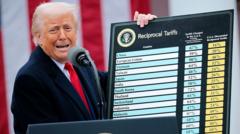Former President Donald Trump has issued a statement negating recent exemptions for smartphones and electronics, indicating that these products will face a revised tariff structure as the trade war with China intensifies.
Trump Rescinds Smartphone Tariff Exemptions, Prepares for New Levies

Trump Rescinds Smartphone Tariff Exemptions, Prepares for New Levies
Trump's recent tariff stance raises uncertainty in the tech market and ignites trade tensions with China.
Trump's latest announcement comes just days after a customs notice had suggested exemptions for Chinese-made electronics, a move that had initially caused a temporary rise in European stock markets. As Trump clarified, products previously believed to be exempt will now be subjected to a new "semiconductor tariff," reflecting ongoing shifts in U.S. trade policy.
On Sunday, U.S. Commerce Secretary Howard Lutnick emphasized the necessity of building essential technology like semiconductors domestically, justifying the adjustments to the tariff directives. He stated that everyday devices reliant on semiconductors — including smartphones — are facing a reclassification impacting their tariff liabilities.
Despite the anticipated exemptions to tariff rates as high as 145%, Trump took to social media to dispute these reports, suggesting they were misleading and that electronics are simply placed in a different “tariff bucket.” He also confirmed more details about the planned semiconductor duties to be forthcoming.
As foreign manufacturers adjust to tariffs, companies like Sony have started increasing prices on products like the PlayStation 5 in various regions, pointing to broader economic challenges like inflation and fluctuating exchange rates. Meanwhile, China’s Ministry of Commerce criticized the minor exemptions as insufficient and vowed to assess their impacts.
Additional complicating factors include ongoing plans for new levies that undermine hopes for a thaw between the U.S. and China, as officials declared there are no current plans for communication between Trump and Chinese President Xi Jinping.
The U.S.-China trade relationship remains fraught with tension, exacerbated by retaliatory tariffs imposed by both sides. Analysts continue to monitor the potential cascading effects these tariffs could bring onto the global economy, with Trump's administration presenting trade policies as a means to bolster American manufacturing jobs.
As developments unfold, the economic landscape remains precarious, with rising tariffs and trade war rhetoric sparking concerns about long-term implications for consumer prices and global markets.
On Sunday, U.S. Commerce Secretary Howard Lutnick emphasized the necessity of building essential technology like semiconductors domestically, justifying the adjustments to the tariff directives. He stated that everyday devices reliant on semiconductors — including smartphones — are facing a reclassification impacting their tariff liabilities.
Despite the anticipated exemptions to tariff rates as high as 145%, Trump took to social media to dispute these reports, suggesting they were misleading and that electronics are simply placed in a different “tariff bucket.” He also confirmed more details about the planned semiconductor duties to be forthcoming.
As foreign manufacturers adjust to tariffs, companies like Sony have started increasing prices on products like the PlayStation 5 in various regions, pointing to broader economic challenges like inflation and fluctuating exchange rates. Meanwhile, China’s Ministry of Commerce criticized the minor exemptions as insufficient and vowed to assess their impacts.
Additional complicating factors include ongoing plans for new levies that undermine hopes for a thaw between the U.S. and China, as officials declared there are no current plans for communication between Trump and Chinese President Xi Jinping.
The U.S.-China trade relationship remains fraught with tension, exacerbated by retaliatory tariffs imposed by both sides. Analysts continue to monitor the potential cascading effects these tariffs could bring onto the global economy, with Trump's administration presenting trade policies as a means to bolster American manufacturing jobs.
As developments unfold, the economic landscape remains precarious, with rising tariffs and trade war rhetoric sparking concerns about long-term implications for consumer prices and global markets.





















